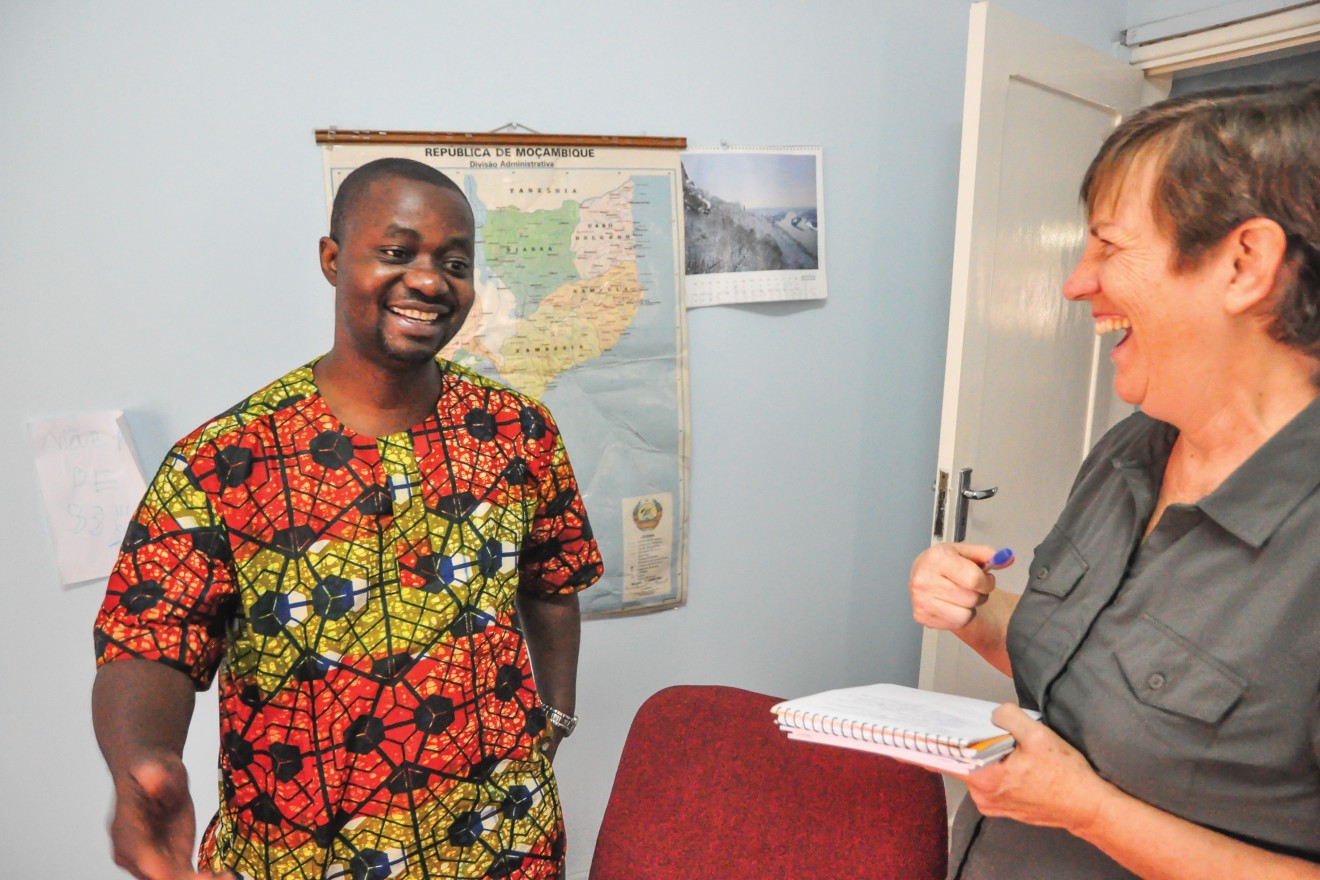
Two decades before Bishop Dinis Matsolo journeyed from Mozambique to the United States to take three courses at EMU’s 2005 Summer Peacebuilding Institute, he was a peacemaker forged in the cauldron of one of the worst wars Africa has seen.
“If you have a gun, you’ll use it…. If someone provokes you and you have a gun, you’ll say, ‘I’ll kill you – I have the power to do this,’” Matsolo told Peacebuilder, by way of explaining why his Methodist Church of Southern Africa promotes nonviolence as a way of life in Mozambique.
This is a country where almost everyone over the age of 40 has fought with a deadly weapon or has family members who did so. And everyone knows people who met violent deaths. During nearly three decades of warfare – starting with a fight for independence from Portugal, followed by 16 years of civil war – it is estimated that Mozambicans handled 10 million firearms, or one lethal weapon for every two persons.
Matsolo gave another example: “If you see a lion in your path and you don’t have a gun, you won’t walk toward it – you’ll find another way. If you have a gun, you’ll feel falsely protected by it and will walk into danger.”
Matsolo’s remarks came during an interview in late 2014 in his office in Mozambique’s capital, Maputo. As district bishop, Matsolo oversees Methodist churches throughout Mozambique serving 16,000 members, almost all traumatized in some way as a result of warfare or its aftermath.
A brief history
Mozambique’s war of independence against Portugal officially ended in 1975, with the triumph of Frelimo, the group that spearheaded resistance to colonial rule.
But the country was left with many armed fighters and little else. Illiteracy stood at 90%. Infrastructure was non-existent. In 1977, Frelimo formally declared itself to be a Marxist-Leninist party with a mission to replace capitalist practices with a socialist economy. Political and military support came from Soviet-aligned countries.
An opposition group, Renamo, emerged with backing from white-ruled Rhodesia (now Zimbabwe) and South Africa, and civil war ensued from the late 1970s to 1992. Widespread atrocities occurred amid economic collapse and famine.
Mozambique’s churches and mosques were under constant attack during this era. Leaders were killed or disappeared. The Catholic Church was regarded as a lackey of the former colonial rulers, and the other religious institutions were viewed through Frelimo’s Marxist lens that religion is “the opium of the people” and therefore useless.
But faced with a country in utter collapse – with a death toll exceeding one million and five million people displaced – the governmental and party leadership of Frelimo took an extraordinary step: it held a three-day meeting in 1982 with the leaders of the principal religious bodies in the country.
Then-president Samora Machel (a former leader of the Frelimo freedom fighters) acknowledged that he needed the help of religious leaders to put the country on a better path. And the leaders readily responded. Their institutions, touching 90% of the population in some way, had been the only ones functioning through all the years of fighting, despite being stressed to the breaking point.
Thereafter church leaders shuttled between Frelimo and Renamo through the late 1980s and into the early 1990s. Their first meeting with Renamo leader Afonso Dhlakama took place in 1988 in bush controlled by his guerrilla fighters. With infinite patience, the church leaders sought face-to-face negotiations between the warring parties.
The church leaders needed, and received, help from leaders in other countries – some meetings between Frelimo and Renamo representatives were held in Kenya; the final series of peace negotiations were held in Italy over many months. Initially, the meetings yielded little.
By early 1992, “the worsening drought in Mozambique was leading to increased attacks by hungry Renamo fighters on civilians and driving many to flee in search of safety and food,” wrote Anglican bishop Dínis Salomão Sengulane and Catholic archbishop Dom Jaime Gonçalves in a 1998 Accord article. “The irony was that the negotiating teams, enjoying the luxuries of Rome, seemed little concerned by the impact of the drought and the plight of ordinary Mozambicans.”[1]
In September 1992, during an impasse in the Rome talks, Archbishop Gonçalves (one of the four official mediators) wondered, “Did either of the parties sense any urgency or responsibility because mass starvation threatened?”
Matsolo, Gonaçalves, Sengulane and the other church leaders were careful not to be perceived as taking sides – they knew it was essential to be viewed as neutral parties focused solely on the well-being of Mozambicans as a whole. In their quest for peace, wrote the Accord authors, the Mozambican churches adopted these principles:
- Look for what unites rather than what divides.
- Discuss problems step by step.
- Keep in mind the suffering that so many people endure as war continues.
- Work with the friends and supporters of both sides; this is fundamental.
- Remember the deeper dimensions of peace such as forgiveness, justice, human rights, reconciliation and trust.
- Work with other groups – the power of the churches being much increased by inter-denominational cooperation.
On October 4, 1992, Frelimo and Renamo signed the Rome General Peace Agreement. Renamo agreed to transition from being a rebel group to being a political party that would stand for election against Frelimo. But the struggle for peace wasn’t over.
Alfiado Zunguza & post-war peacebuilding
In 1993, Mennonite Central Committee sent a couple in their late 50s, Sara and Fremont Regier, to Mozambique as country co-directors. In The Mennonite (March 2015), Sara said this was their most difficult placement in their three decades of service work.
Mozambique was a dangerous place to live for anyone – “people were coming back from refugee camps to find homes destroyed and looted,” said Sara, now a widow (Fremont died of cancer in 2010). But Sara also remembered that Mozambican church leaders “had an amazing love for Christ, a desire for peace and a strong sense of call,” she wrote.
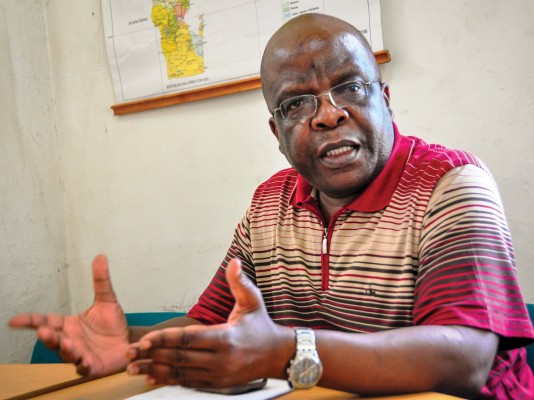
The Regiers encouraged Alfiado Zunguza, a Methodist pastor who was active in the peace and reconciliation work of the Christian Council of Mozambique (CCM), to enroll in EMU’s Summer Peacebuilding Program (SPI).
Before going to EMU, Zunguza helped launch the CCM’s “Turning Guns Into Hoes” program. This was an ambitious nationwide program that aimed at demilitarizing the population. In exchange for turning in guns and other military artifacts, people received useful items, such as sewing machines, bicycles, farm implements and construction materials.
Boaventure Zitha, CCM’s long-time coordinator for the weapons-exchange program, told Peacebuilder it brought to life the prophetic vision of the Biblical Micah: “They shall beat their swords into ploughshares, and their spears into pruning hooks.”
Many of the 800,000 weapons collected from 1995 to 2014 (when international donors stopped paying for the useful items offered in exchange) have been destroyed under controlled conditions. But some have been safely dismantled and used to create intriguing sculptures displayed widely in Mozambique and internationally in galleries.
In addition to collecting weapons, the CCM has helped communities embrace former soldiers – “it’s an African tradition that sons and daughters must always be welcomed home,” said Zitha – even if these children have maimed and killed people and wreaked destruction. Elders and chiefs oversee purification and reconciliation rituals (often slaughtering animals for communal meals) to enable ex-soldiers to return to their home communities, he explained.
Subsidized by the United Methodist Church USA, Zunguza took his first four SPI courses in 1996.
When Zunguza returned to Mozambique after his summer of peace studies, he and his church established a department of conflict resolution and reconciliation to do ongoing peace work.
The next year, 1997, the United Methodist Church offered Zunguza the opportunity to be a full-time master’s student in conflict transformation at EMU. It was a difficult decision. He would have to leave behind his wife Carla and daughters, one of whom was a newborn. With Carla’s support, he took what they viewed as a “once-in-a-lifetime opportunity.”
CJP founding director John Paul Lederach recalls having Zunguza in two classes in 1997, when he wrote a paper outlining the founding of something similar to SPI in Mozambique.
“Hearing John Paul and other professors talking about conflict transformation as a strategy to address conflicts from interpersonal to systemic change, I came to the conclusion that this was the kind of strategy Mozambique needed to move from a conflict-habituated society to a peaceable country,” Zunguza recalled recently.
“I learned that numbers matter in nonviolent actions, and getting more people excited and committed to conflict transformation was a great way of promoting change in a peaceful and sustainable way,” he added. “Launching an institute similar to SPI, and directed to Portuguese-speaking countries in Africa, was a strategic move to expand the number of peacebuilding activists in Mozambique. Thanks to SPI, we didn’t need to reinvent the wheel.”
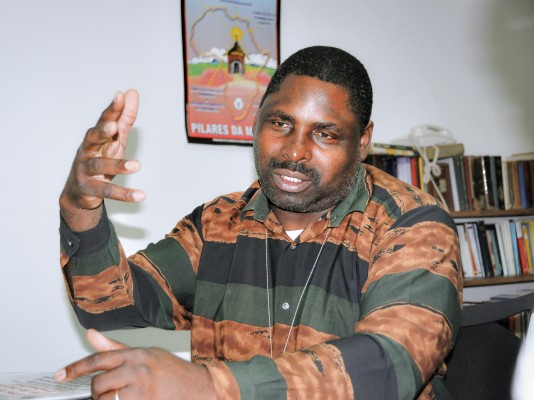
In 1999, Zunguza returned home and led his church department to expand beyond church-initiated mediations and reconciliation meetings to becoming a broad-based center for conflict transformation named JustaPaz.[2] As an independent organization, JustaPaz was able to reach a larger constituency, though it was still backed by its founding church, with church representatives on its board.
“JustaPaz was our baby,” Methodist bishop Denis Matsolo told Peacebuilder with a satisfied smile. Matsolo views the 1992 peace agreement in Rome (which he called a “ceasefire” agreement) as simply a door cracked open that JustaPaz needed to help people walk through constructively.
“Peaceful co-existence is a process, not an event,” said Matsolo. After the ’92 agreement, the next step was “concentrating on creating a community-based culture of peace.”
“We [Mozambicans] had to grow enough to understand that we can live together and wear different political T-shirts and think differently, because diversity is not a problem. There’s richness in diversity. It’s only a problem if the others think it’s a problem, if they think, ‘If you are not part of us, you are against us.’ We needed to create a safe space for dialogue.’’
One of the first initiatives of JustaPaz was working with its own base constituency, the Christian Council of Mozambique, which Matsolo led as general secretary.
Role of religious peacemakers
The religious bodies of Mozambique had weathered 30 years of warfare without turning on each other. None had ever formally lined up with one of the political-military groups, despite the fact that most of the resistance leaders came from Presbyterian or Methodist backgrounds.
When Methodist pastor Joao Damiao Elias received his first church assignment in 1991, he found himself in northern Mozambique amid a largely Muslim community. “I invited them to my church, and they came. They invited me to the mosque, and I went. We had no problems!”
But not having problems did not mean that the religions were formally cooperating with each other.
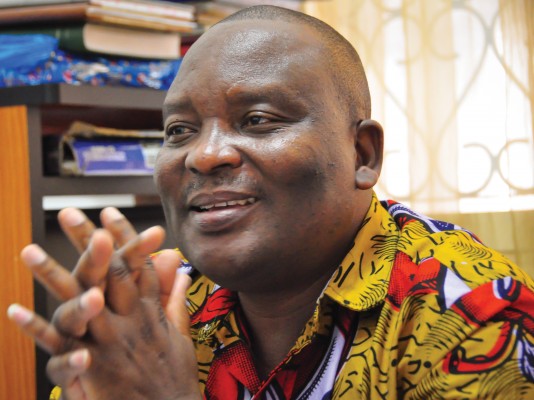
The Muslims were strong in the north and along the seacoast (due to a history of trade with Islamic countries), the Catholics were in the vast majority in central Mozambique, and various Protestant churches had spread their wings in the south.
Traditional religious practices continued everywhere – followed by perhaps half the population – often mixed with the institutionalized religions of the region. Plus there were small groups of Jews, Hindus and Baha’is. Families were often divided, as explained in a fall 2014 article published by the United Methodist Church:
Members of the church itself were split between the two parties, Renamo and Frelimo. Sometimes even members of the same family had backed different sides during the war. Now they were all expected to live and work and attend church together.
In 2006 JustaPaz began facilitating “constructive dialogues” among the various faith groups through interfaith symposiums held in all regions of the country. Soon thereafter, JustaPaz began training individuals from each religious tradition to play peacemaker roles in their communities and to also train others to play those roles.
Over eight years, hundreds of leaders went through JustaPaz trainings, designed to make local religious institutions, often the only community hub in remote areas, more effective in responding to simmering conflicts, community development issues, poverty, HIV/AIDS, and other local matters of well-being.[3]
Keeping elections honest
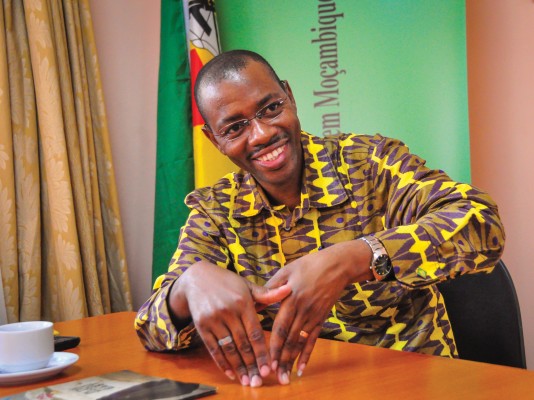
In another step toward a community-based culture of peace, a coalition of religious and civil society groups founded the Electoral Observatory in 2003 to address fears of corrupt electoral processes by independently observing the voting and the counting of votes.[4] Its executive director, Anastacio Chembeze, has been trained at both JustaPaz and a sister institute, the Africa Peacebuilding Institute (when it was in Mindolo, Zambia), instructed by Babu Ayindo of Kenya (MA ’98) among others.
When a Peacebuilder reporter asked to visit JustaPaz during October 2014, Zunguza requested a two-month postponement of the visit, explaining that everyone associated with JustaPaz would be working non-stop during the weeks around the national elections, scheduled for October 15, to ensure “free, fair and transparent elections” and to head off violence. When the polls opened, the Electoral Observatory had 2,500 observers around the country to monitor the voting.
“On election day, we had one terrible example,” Chembeze said when the Peacebuilder reporter finally visited in December. “There was a shooting and the polling station with its election materials was burned. In two other places, there was some fighting, with property damage and people injured. These were stains on the elections.
“I don’t believe these have affected the outcome of the elections, but there are things we cannot excuse – we need to be tough on this. We can’t settle for 85% peaceful elections; we’re aiming for 100%.”
In Mozambique (indeed in many countries in the world), the victors in elections play out a “winner-takes-all” scenario. With political power comes access to resources, so electoral battles are hard fought. Power, once attained, is not easily relinquished. This is one of the reasons why fighting, believed to be linked to the survival of one’s group, often erupts around election time.
In 2013, a decade after the Electoral Observatory began its work, the Parliament of Mozambique decided to set up a National Electoral Commission. Parliament appointed Abdul Carimo Sau, general secretary of the Islamic Council of Mozambique (one of the founders of the Observatory), to chair this commission, made up of appointees from disparate groups in the political spectrum.
To prepare for their work together, Carimo dispatched his six sitting commissioners to JustaPaz’s summer peacebuilding institute for two weeks of training. He himself attended the two-day opening conference that JustaPaz always holds before the two-week session.
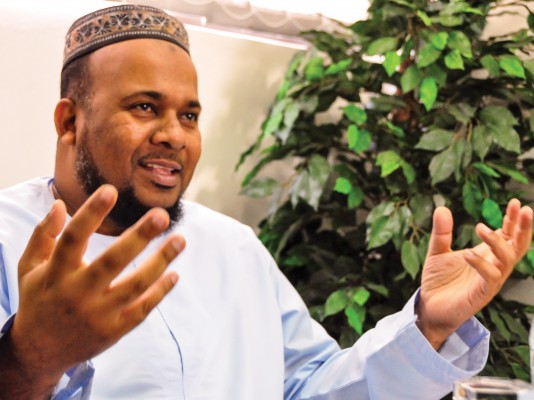
“We knew each other from our organizational roles,” said Carimo, in explaining the reason he sought JustaPaz training for his commissioners. “This gave us a chance to know each other in other ways, beyond our organizational boundaries.”
Carimo also thought the training would enable the commissioners to “speak the same peace language and use the same skills” when working with others in the broad network of JustaPaz-trained people. “JustaPaz gave us small books [for reference], and I use them.”
With Muslims about half as numerous as Christians in Mozambique, Carimo notes with satisfaction that “all religions in this country work together in a peaceful environment.”
“It becomes a catastrophe for a country or a continent when religious leaders use religion to promote their political aims. Our constitution has both freedom of religion and the separation of church and state,” he told Peacebuilder. “I think this is very important for the stability of our country. We can be a model for others.”
On dialoguing with citizens
Beyond improving the electoral process, JustaPaz aims to foster constructive dialogue between governmental decision-makers and those affected by their decisions.
“Civil society has the power to change the way governance is conducted,” Zunguza explained in the September-October 2014 New World Outlook. “Otherwise, government officials will use the divisions in society to maintain their power. Civil society must challenge this assumption of power and hold the government accountable.”
One activity for which many Mozambicans wish to hold their government accountable is the extraction of resources, often by foreign powers. Currently the most visible foreign power is China.
Near the waterfront in downtown Maputo in late 2014, signage in Chinese, Portuguese and English announced the construction of conference-resort facilities by Chinese firms. One of the most modern buildings facing the water was the Ministry of Foreign Affairs headquarters, built with money from the Chinese government.
“A third of all roads in the country are being built by Chinese companies in addition to the auditor-general’s office, Maputo International Airport, national soccer stadium, national conference center, communications networks, and water supply projects,” wrote David H. Shinn in “China’s Involvement in Mozambique.”[5]
“The Chinese are denuding the country of its timber. In fact, they’re extracting as many natural resources as they can. They’re destroying our environment,” said one small business owner. “I’ve protested against this. Our government is permitting too much of this, with little benefit to the people.”
Mozambique is a poor country by any financial standard. On its list of 187 countries in the world, the International Monetary Fund ranks Mozambique as No. 181 in gross domestic product per capita (pegged at $1,046 in 2013).
Major funding to stabilize Mozambique from the International Monetary Fund, World Bank and other international organizations also comes with pressure on the Mozambican government to repay at least some of the money.
On the surface, therefore, it may be understandable why the government is willing to sell whatever it can to get money into its coffers for getting out of debt and for (one hopes) providing roads, schools, hospitals and other services to its citizens.
But the people living in the regions most affected by the sell-off of natural resources don’t necessarily agree. And here is where JustaPaz is trying to be helpful.
Zunguza pointed out that development plans can either worsen or ease conflict, depending on how these plans are implemented. The trainings of JustaPaz encourage “officials to reflect critically on the implications their development policies would have on the local communities. Were their policies helping to reconstruct the country or just creating more conflict?”
To be clear: JustaPaz doesn’t position itself as a critic of any government. On the contrary, it views government as “a strategic partner in peacebuilding and development,” said current JustaPaz executive director Francisco de Assis. “You can’t have security and stability without a functioning government, supported by the communities it serves.”
Working with police, judges, courts
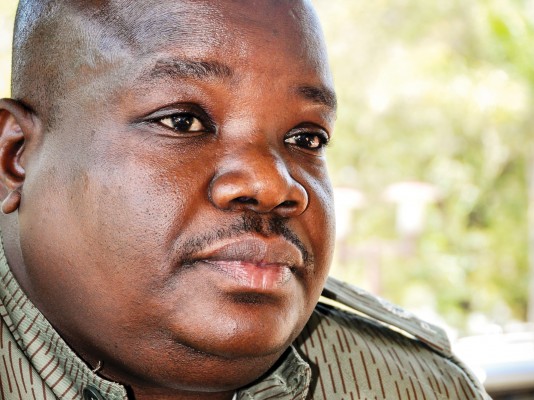
In the legal arena, JustaPaz is helping law-enforcement officials to be more humane, more respectful of human rights.
Tomás Passuane talked with Peacebuilder at an outdoor café within eyesight of the national police headquarters for Mozambique. Inside that multi-story, security-tight structure, he heads the training program for 30,000 police working across Mozambique. Each year, 3,000 fresh recruits join the police force, all of them under the training oversight of Passuane.
In 2004, Passuane was one of two Ministry of Interior officials dispatched to accept JustaPaz’s offer of two free courses for each ministry official. Passuane chose to take a one-week module in conflict transformation and another in mediation and negotiation.
With his doctorate in psychology and warmly humble demeanor, Passuane would seem unlikely to need training in empathic listening and compassionate justice. Yet he says he was overly tough on people in his first 18 years as a police officer, and only began to change after he took the JustaPaz trainings. “I used to be in the investigation unit,” he said through a translator, “and I now feel I did not act like a professional then.
“I recall a case when I beat a boy arrested for theft and didn’t give him time to talk to me. Then, at the end of the day, he said he had not been the one who stole and he told me who did it. I made a mistake because I was not an active listener, the way I am now. Now I make time to discuss deeply the issues.
“It is common in rural areas for victims and offenders to be willing to sit and discuss issues and to dialogue to resolve conflicts,” he added. “It is common in rural areas for offenders to apologize and for the parties to reconcile with each other. Our police need to understand that these are good practices and they need to support them.”
Passuane returned to JustaPaz’s two-week summer institute in 2008 and took two more courses. Since then, he has helped form a department within his police force to specifically deal with domestic violence.
The biggest change for him? With a smile, he simply said, “My wife was the first to applaud my JustaPaz training.”
Ideally, if Passuane had the budget, he would use JustaPaz to train all his new police officers. Second-best would be for JustaPaz to train one or two police officers in human rights, who could then be trainers in each of the 16 police districts.
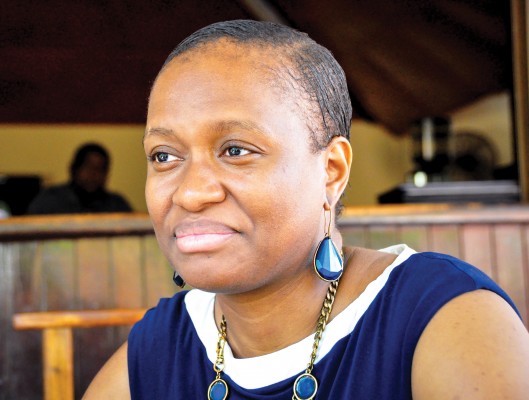
Marlene Rosária Mafundza is an attorney, a recorded hip-hop singer, and a human rights activist, specially concerned for women. “Torture by police – it’s a culture in Mozambique,” she told Peacebuilder in excellent English. “I hear stories every day.”
After taking one JustaPaz course in human rights and the law, Mafundza was invited to present a paper, “Gender and the Political Empowerment of Women,” at a JustaPaz-sponsored conference in mid-2014 on building political stability.
As a result of this exposure, Mafundza decided “it is super important for JustaPaz to train police. And to train judges too. And to make sure that citizens know their rights.”
JustaPaz executive director Francisco de Assis later explained that, since 2004, JustPaz has admitted two police officers per year into its two-week peacebuilding institute without charging for this service. If funding were available, JustaPaz would expand the trainings of police.
As for the courts, the Ministry of Justice did use JustaPaz to help train 960 judges and tribunal authorities in all 16 districts of Mozambique from 2011 to 2013, according to Samel Salimo, an advisor to the Ministry on community courts and rural tribunals.
These trainings were done in 16 groups of 60, who gathered for five straight days. “JustaPaz played a very important role in introducing restorative justice and mediation,” Salimo said.
It’s necessary to understand that Mozambique has two judicial systems that are intended to complement each other.
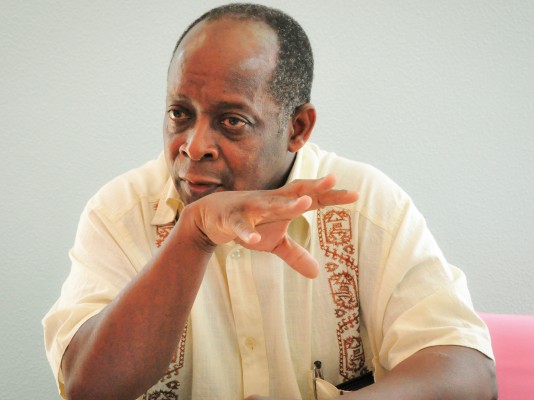
There’s the formal system derived from the Global North, with judges listening to adversarial lawyers who argue over which laws have been broken, with what consequences for whom. This costs money and takes time, plus the courts are only located in the larger municipalities.
And then there’s a huge network of less-formal, more indigenous “community courts” – 3,000 of them – which deal with everyday issues, like the theft of a cow or domestic conflict or land usage, where the people involved speak up for themselves and the matter is discussed to arrive at a settlement acceptable to the community. “We get positive feedback about the community courts. More than half of the community judges are women. It doesn’t cost much, and it’s fast,” said Salimo.
But, as helpful as the community courts are, they would benefit greatly from more exposure to the conflict transformation techniques taught by JustaPaz, he added.
Waxing and waning with funding
In 2004, the year that Tomás Passuane enrolled in his first JustaPaz module, JustaPaz moved its offices from the business district of Maputo to a residential suburb, Matola, in pursuit of cheaper rent payments.
Over the years, the size of the JustaPaz staff has waxed to 15 and waned to four, depending on the size and type of grants secured for a period of work. For its 2014-15 work by its staff of 11 in a four-room office, JustaPaz expects to get 72% of its $350,000 (in U.S. dollars) budget from Bread for the World-Germany, plus $105,000 from the United Methodist Church. USAID also provides some funds for HIV-AIDS education work.
Relative to Angola’s 27-year civil war (costing millions of lives) after its independence from Portugal in 1975, Mozambique has done well. Its civil war ended after 16 years, with fewer casualties than Angola. Despite huge obstacles, Mozambique has made steady progress toward being a multi-political-party society where all religions, all ethnicities and both genders can live in their own ways without being victims of, or resorting to, violence. Religious leaders cooperating with each other to build peace, plus civil society organizations like JustaPaz, deserve much of the credit for this.
So do certain international funders who have chosen to walk alongside Mozambicans for decades (not just a year or two) as they resurrect their country from ashes: Bread for the World (funded by a consortium of Protestant churches in Germany); DIAKONIA Sweden (also a faith-based organization); the United Methodist Church; Catholic Relief Services; and some governments, notably those of Sweden, Denmark and Switzerland.
Suggestions for donors
Over the years, Mozambicans have come to know which donors are most helpful and which could be more constructive. In response to questions, Peacebuilder garnered these two pieces of advice for prospective international donors:
(1) Take the time to visit and see the needs and the results in person, rather than asking for voluminous computer-typed reports, each laboriously prepared somewhat differently in response to the demands of the funder. In the words of Boaventure Zitha, who runs the weapons-exchange program under the Christian Coalition of Mozambique:
If I’m trying to get people to give up their AK-47s, I’ll need a day to talk with people, two days to convince them to come to a meeting, and three days to have a meeting, and then I will get some AK-47s turned in. But when I report this to America, they’ll say, ‘Why so much time? Why did this cost so much money?’ But you can’t deliver change in two days. This is not like following a blueprint. And then I’ll have to spend time meeting the Americans’ demand for kilograms of reports. Half my time will be lost to producing reports. Why don’t they just come meet us face-to-face and see for themselves?
(2) Realize that the absence of open warfare does not mean the work of peacebuilding is over. On the contrary, peacebuilders will always be needed to transform conflict constructively. This is especially true in the absence of stable, trusted governmental institutions. In the words of JustaPaz executive director Francisco de Assis:
In the West, unless CNN comes in, people think there are no major problems. But every crisis, every war, really started long ago. That’s what needs to be recognized in order to prevent future wars. Humans can change for the better or for the worse – and that’s why the work of peacebuilders will never be over. We must never stop working at encouraging humans to change for the better, though none of us will ever reach perfection. Peacebuilding needs to be a line in budgets everywhere. Not just for a couple of years, or even a decade, but forever. We need to be doing this work for generations to come.
Footnotes
- From “A Calling for Peace: Christian Leaders and the Quest for Reconciliation in Mozambique” in Accord, CJP professor David Brubaker, who spent early 2012 in Mozambique researching its peace process, confirms and applauds the role played by church leaders. (Immediately after the 1992 peace accord, Brubaker did peace education and conflict resolution trainings in Mozambique on behalf of UNICEF.)
- There is also the JustaPaz organization in Colombia whose founder, Ricardo Esquiva, was among the visionaries who conceived of CJP in the early JustaPaz means “JustPeace” (combining the ideas of justice and peace) in both Spanish and Portuguese, though in the Mozambican version of the term, the “J” is pronounced as a hard consonant.
- From “Justapaz: Peace, Restorative Justice, and Human Rights in Mozambique” by Christie House, originally published in the September-October 2014 of New World Outlook, a United Methodist Church magazine, posted umc.mission.org.
- The groups were the Christian Council of Mozambique, the Islamic Council of Mozambique, the Episcopal Conference of the Catholic Church, the Human Rights League, the Mozambican Association for the Development of Democracy, the Centre of Democracy and Development Studies, the Civic Education Institute, and the Organization for Conflict
- Published in International Policy Digest, 08/02/12.